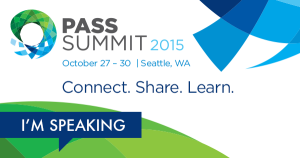This is a short break from my usual blog posts to share some information on upcoming presentations I’m giving that might interest you.
Performance Palooza – Virtual Performance Chapter
Coming up in two weeks (July 23), I’ll be part of the annual Performance Palooza that is run by the Performance PASS Virtual Chapter. I’m pretty excited, as this will be a new session I’ve built from some work I’ve been doing on benchmarking SQL Server.
SQL SERVER BENCHMARKING: THE POWERSHELL SPEEDOMETERHow fast do you think you were going? The only way to be sure is to have a reliable way to measure your performance. The challenge with SQL Server is that there are many aspects of your stack that you need to measure and understand. Powershell, with its ability to access and report on all these different levels, can give you a robust tool to benchmark your SQL Server. This session will cover benchmarking methodologies, the tools Powershell offers for capturing performance information, and will demonstrate how you can use them to measure performance statistics. After attending this session, you will understand how to effectively use Powershell to measure your database speed.
RSVP here if you’re interested: https://attendee.gotowebinar.com/register/6348286936653801474
Upcoming Precons
I’ve had the opportunity to present my Introduction to Powershell for SQL Server DBAs now at both SQL Saturday Albuquerque and SQL Saturday Atlanta. This has been a great time for me and I’ve already had comments from attendees of how they’ve used Powershell in their current jobs. If you plan on attending either SQL Saturday Omaha or SQL Saturday Denver, you have an opportunity to learn some Powershell and add this robust tool to your skill set.
Introduction to Powershell for SQL Server DBAs
This full day session will help build your foundation for learning and using Powershell. While we will be focusing on using Powershell as a SQL Server Database Administrator (or Developer), much of the material will also review general use for system administrators. By attending this training, you will gain an understanding of what Powershell is, how you can use it in your day to day management of your environments, and what specific things can be done using Powershell in a SQL Server environment.
RSVP to either of these links if you are interested:
- SQL Saturday Omaha: http://www.eventbrite.com/e/sql-saturday-omaha-pre-cons-tickets-17823195658?aff=mike
- SQL Saturday Denver: https://www.eventbrite.com/e/sqlsaturday-441-denver-pre-con-introduction-to-powershell-tickets-17243851825
IT/DEV Connections – Las Vegas, NV #ITDevCon
 I’m super excited to be speaking at this year’s IT/DEV Connections Conference in Las Vegas. This is a huge opportunity for me to share some of the useful Powershell techniques that I’ve built out in my work environments. I will be presenting two sessions:
I’m super excited to be speaking at this year’s IT/DEV Connections Conference in Las Vegas. This is a huge opportunity for me to share some of the useful Powershell techniques that I’ve built out in my work environments. I will be presenting two sessions:
There are TONS of great speakers at this event, so it’s a huge learning opportunity for attendees and will be a great time.
PASS Summit 2015 – Seattle, WA #PASSSummit2015
 The grandaddy of ’em all. I’m honored to be part of this year’s Summit speaker line up. This is the premiere SQL Server conference and will be my fifth year in attendance. I’ll be speaking on a Powershell topic that will not only help out a lot of DBAs with their day-to-day work, but will also give you some insights in to how I think the world of database infrastructure is changing with the two magic buzzwords of “DevOps” and “the Cloud”. If you’re the kind of DBA that has to manage the struggles of deploying and maintaining SQL Servers in a highly-available environment or a large enterprise, this session can make your life a whole lot easier.
The grandaddy of ’em all. I’m honored to be part of this year’s Summit speaker line up. This is the premiere SQL Server conference and will be my fifth year in attendance. I’ll be speaking on a Powershell topic that will not only help out a lot of DBAs with their day-to-day work, but will also give you some insights in to how I think the world of database infrastructure is changing with the two magic buzzwords of “DevOps” and “the Cloud”. If you’re the kind of DBA that has to manage the struggles of deploying and maintaining SQL Servers in a highly-available environment or a large enterprise, this session can make your life a whole lot easier.
PowerShell and the Art of SQL Server Deployment
In today’s tech world, IT professionals are driven to perform tasks faster and more consistently. Automation is the watchword for our success, whether we are deploying SQL Server to private virtual clouds or public platforms such as Azure IaaS. This session focuses on rapidly creating and configuring SQL Servers, using PowerShell and desired state configuration. You will see practical examples of how to create repeatable builds of SQL Server that can be deployed in a matter of minutes. We will also review how these techniques can be applied to both public and private cloud platforms, helping to ensure success in any situation.
Even if you don’t want to attend my session, you should seriously consider registering for the Summit. It’s the largest pure-SQL Server conference in the world and has been a tremendous boost for my career over these past five years. And now I get to speak there! (How cool is that)

 I’m tweeting!
I’m tweeting!